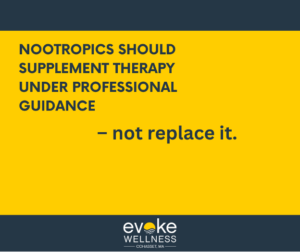As you consider options for improving your mental health and managing substance use disorders, nootropics may offer promising potential. It is important to note the evidence on nootropics, also known as ‘smart drugs,’ and their applications in mental health treatment and addiction recovery. Let’s examine the current research on how these supplements may enhance cognition and support neurological functions. Additionally, we’ll discuss possible risks and considerations for responsible usage. Our goal is to provide you with a balanced perspective on the state of knowledge in this developing field. We aim to empower you to make informed decisions about incorporating nootropics into your wellness regimen or substance abuse treatment plan. Call us at (617) 917-3485 today or reach out online.
Introduction to Nootropics
What Are Nootropics?
Nootropics, also known as “smart drugs” or cognitive enhancers, are compounds that can improve various aspects of brain function. These substances may enhance memory, focus, motivation, and overall cognitive abilities in healthy individuals.
Types of Nootropics
Some common types of nootropics include prescription drugs (e.g., modafinil), natural supplements (e.g., omega-3 fatty acids), and synthetic compounds (e.g., racetams). Each class targets different pathways and mechanisms in the brain.
Potential Benefits
Early research suggests nootropics could aid those in substance abuse treatment by improving executive function, reducing cravings, and supporting overall brain health. However, more rigorous studies are still needed to fully understand their therapeutic potential.
How Nootropics Work in the Brain
Nootropics, also known as “smart drugs” or cognitive enhancers, work by modulating various neurotransmitter systems in the brain. They can enhance focus, memory, motivation, and overall cognitive performance.
Neurotransmitter Regulation
Many nootropics influence neurotransmitters like acetylcholine, dopamine, and glutamate – key players in learning, attention, and neuroplasticity. For example, racetams boost acetylcholine levels, while L-theanine promotes dopamine and serotonin production.
Neuroprotection and Neurogenesis
Some nootropics demonstrate neuroprotective effects by reducing oxidative stress and inflammation in the brain. Others may stimulate neurogenesis – the growth of new brain cells in the hippocampus, a region vital for memory formation.
Improved Brain Energy
Certain nootropics enhance cerebral blood flow and glucose metabolism, supplying more energy and oxygen to meet the brain’s high metabolic demands during cognitive tasks. Creatine and citicoline are examples of nootropic compounds that optimize brain energy utilization.
Types of Nootropics
There are several categories of nootropics or “smart drugs” available. Natural nootropics include herbs, nutrients, and compounds derived from food sources like Ginkgo biloba, omega-3 fatty acids, and L-theanine from green tea.
Racetams
Synthetic compounds like piracetam, aniracetam, and oxiracetam belong to the racetam family. These are believed to enhance focus, memory, and neural connections in the brain.
Prescription Stimulants
Medications like Adderall, Ritalin, and Modafinil prescribed for ADHD and sleep disorders can potentially boost concentration and wakefulness when used off-label as nootropics.
Other Synthetics
Novel molecules like Noopept, coluracetam, and phenylpiracetam are research chemical nootropics with proposed cognitive-enhancing effects, though more study is needed.
The Downside of Nootropics
While nootropics show promise for cognitive enhancement and addiction recovery, you must be aware of their potential downsides and risks. One might consult a medical professional and refer to our addiction resources page for more information.
Lack of Regulation
Many nootropic supplements lack rigorous safety testing and are not regulated by the FDA. This raises concerns about their purity, dosage, and long-term effects.
Adverse Effects
Common side effects include headaches, nausea, anxiety, and insomnia. More severe reactions like liver injury, seizures, or dependency are also possible with some nootropics.
Interactions
Nootropics may interact with medications, supplements, or pre-existing conditions in dangerous ways. Consulting a doctor before use is crucial, especially for those in recovery.
While promising, the nootropics market remains largely uncharted territory. Responsible use necessitates caution, moderation, and medical guidance to mitigate risks.
Using Nootropics for Mental Health Therapy
Nootropics, also known as “smart drugs” or cognitive enhancers, may offer potential benefits for managing mental health conditions like depression, anxiety, and addiction. When used under medical supervision, certain nootropics could help regulate neurotransmitters, reduce inflammation, and promote neuroplasticity – factors linked to improved mood, focus, and cognitive function. For those seeking mental health therapy services, consult a professional today.
Safe Usage
However, it’s crucial to consult a qualified healthcare professional before incorporating nootropics into a treatment plan. Many over-the-counter supplements lack robust safety and efficacy data. Proper dosing, monitoring for interactions, and addressing underlying issues are essential for responsible use.
Therapeutic Potential
Early research suggests some nootropics like omega-3s, L-theanine, and specific herbs and mushrooms may complement traditional therapies by enhancing neurochemistry and resilience to stress. As this field evolves, exploring their role in a comprehensive, integrative approach holds promise for optimizing mental wellness.
Nootropics for Cognitive Behavioral Therapy
Cognitive behavioral therapy (CBT) aims to modify unhelpful thoughts and behaviors. Certain nootropics may enhance focus and attention during CBT sessions for improved engagement.
Potential Benefits
- L-theanine promotes calm, relaxed attentiveness without sedation. This amino acid is found in green tea.
- Bacopa monnieri is an herb used in Ayurvedic medicine to boost memory and reduce anxiety.
Approach with Caution
While some nootropics show promise, others lack solid research on efficacy and safety. Always consult a doctor before use, especially if taking medications or dealing with a medical condition. Nootropics should supplement therapy under professional guidance – not replace it.
The Potential of Nootropics in Substance Abuse Treatment
Nootropics, or “smart drugs,” have emerged as a promising adjunct therapy for treating substance abuse disorders. These cognitive-enhancing supplements may help improve focus, memory, and overall brain function during recovery.
Neuroprotective Benefits
Many nootropics possess neuroprotective properties that can mitigate brain damage caused by long-term substance abuse. For instance, L-theanine – an amino acid in green tea – has been shown to shield neurons from alcohol-induced toxicity.
Curbing Cravings and Relapse
Certain nootropics like rhodiola rosea and bacopa monnieri may help curb cravings and reduce relapse risk by modulating neurotransmitters like dopamine and GABA. This could aid in managing withdrawal symptoms and breaking the cycle of addiction. However, nootropics can also be used in combination with a drug rehab program in which professionals will tailor a program specific to one’s needs while recovering from active addiction.
Can Nootropics Help With Addiction Recovery?
While research is still emerging, some evidence suggests nootropics may aid in addiction recovery. These cognitive enhancers could potentially:
Support Brain Repair
Addiction can damage areas of the brain tied to decision-making, memory and self-control. Certain nootropics may promote neurogenesis and protect neurons.
Reduce Cravings and Withdrawal
Nootropics affecting neurotransmitters like dopamine could theoretically curb drug cravings and ease withdrawal symptoms during drug and alcohol detox.
Enhance Cognitive Function
By boosting focus, motivation and mental energy, the right nootropics may make therapy and lifestyle changes during recovery more manageable.
Of course, nootropics should never replace proven addiction treatments. But as an adjunct therapy, they may provide modest benefits for some recovering from substance abuse disorders. More clinical studies are still needed.
Most Promising Nootropic Options for Substance Abuse
Racetams
Racetams like piracetam and aniracetam show promise in aiding recovery from substance abuse disorders. These compounds may help repair brain damage, improve cognitive function, and reduce cravings.
L-Theanine
This amino acid promotes a calm, focused state without sedation. L-theanine enhances the action of anti-craving medications and reduces anxiety – a major relapse trigger.
Rhodiola Rosea
An adaptogenic herb that helps the body resist stress. Rhodiola can alleviate fatigue, improve mood, and enhance cognitive performance during addiction recovery.
Summary and Recommendations for Using Nootropics
In substance abuse treatment and recovery, nootropics may offer supplemental cognitive benefits. However, more research is needed to fully understand their potential.
Safe Usage Guidance
- Consult a medical professional before using any nootropic substances. They can evaluate individual risks and interactions with medications or conditions.
- Start with minimal effective dosages. Gradually increase only if benefits are experienced without adverse effects.
Promising Areas for Further Study
Preliminary evidence suggests certain nootropics could assist aspects like focus, motivation, and impulse control during recovery. Rigorous clinical trials are crucial to verify efficacy and safety profiles.
Responsible, medically-supervised usage may cautiously explore nootropics’ adjunctive role within comprehensive treatment plans. But they are not a substitute for evidence-based therapies.
Conclusion
While more research is still needed, the potential benefits of nootropics as a complementary treatment for substance abuse show promise. As you consider their responsible use, reflect on how improved cognition could support your recovery journey. An open mind, patience, and guidance from professionals will help determine if nootropics are right for you. Every person faces unique challenges, but new possibilities exist on the path forward. Approach your health holistically, lean on your community, and have hope that each day brings renewed opportunities to grow stronger. The road ahead may wind, but trust that small steps can lead to brighter tomorrows. You have the strength within to persevere and build the life you deserve.
Begin Your Journey with Evoke Wellness at Cohasset
If you or a loved one is considering treatment, Evoke Wellness at Cohasset invites you to contact us. Our compassionate team is ready to answer your questions, discuss your needs, and help you take the first steps toward recovery. In Cohasset, you’ll find more than just a treatment program – you’ll discover a community dedicated to your wellness and success. Together, let’s embrace the journey to recovery and the promise of a new beginning. Call us at (617) 917-3485 today or reach out online.





